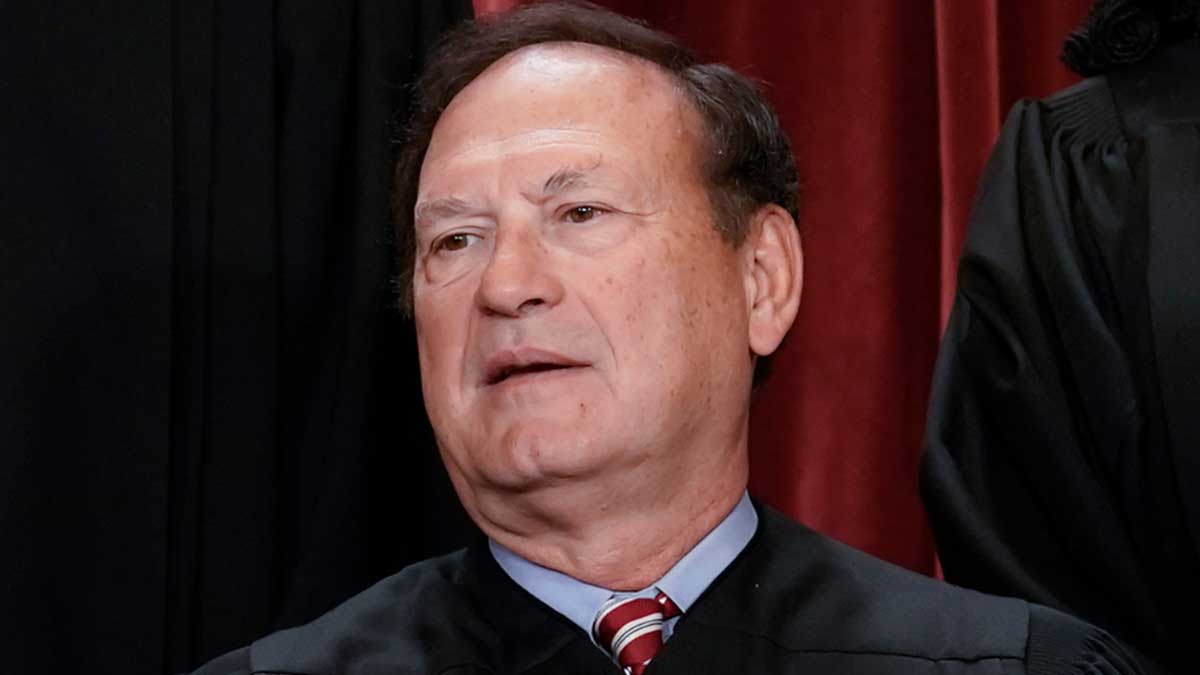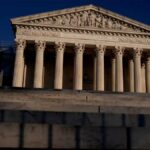- Home
- Billionaires
- Investing Newsletters
- 193CC 1000
- Article Layout 2
- Article Layout 3
- Article Layout 4
- Article Layout 5
- Article Layout 6
- Article Layout 7
- Article Layout 8
- Article Layout 9
- Article Layout 10
- Article Layout 11
- Article Layout 12
- Article Layout 13
- Article Layout 14
- Article Sidebar
- Post Format
- pages
- Archive Layouts
- Post Gallery
- Post Video Background
- Post Review
- Sponsored Post
- Leadership
- Business
- Money
- Small Business
- Innovation
- Shop
Recent Posts
Alito Secret Recording: Supports ‘Godliness’

A secret recording released on Monday captured Supreme Court Justice Samuel Alito expressing his belief that the U.S. should return to a “place of godliness,” adding to a series of controversies that have surrounded the conservative justice in recent years.
Alito’s Supreme Court tenure began with controversy in January 2006. The American Civil Liberties Union opposed his nomination, citing his support for policies that could “abridge individual freedoms.” His wife left the confirmation hearing in tears after Democrats discussed his involvement with a Princeton University alumni group that excluded women and minorities. This initial controversy set the tone for Alito’s tenure on the court, with subsequent incidents continuing to draw public scrutiny.
In January 2010, Alito openly opposed President Barack Obama during his State of the Union speech, shaking his head and mouthing “Not true” as Obama criticized the court’s recent campaign finance ruling. This display of emotion was a rare breach of protocol for a Supreme Court justice during such an event, highlighting Alito’s willingness to publicly challenge the president.
June 2015 saw Alito writing a dissenting opinion in the Obergefell v. Hodges case, which legalized same-sex marriage. He expressed concern that the ruling would vilify those who opposed it, a stance that has continued to draw controversy. Alito’s February order denying a sex discrimination case further solidified his position on this contentious issue, reinforcing his reputation as a staunch conservative.
In November 2020, Alito delivered a speech at a Federalist Society convention criticizing Covid restrictions for infringing on individual liberties and warning about Democratic threats to restructure the court. He also suggested that the left threatens free speech and religious liberty, further polarizing public opinion about his judicial philosophy.
Alito authored the majority opinion in Dobbs v. Jackson Women’s Health Organization in June 2022, which overturned Roe v. Wade. This decision sparked nationwide protests and threats against justices. The controversy began even before the ruling, with a leaked opinion in May fueling public outrage and demonstrations.
In July 2022, Alito criticized foreign leaders for condemning the court’s abortion decision during a speech at Notre Dame Law School. He noted that he had “the honor” of writing a decision criticized by a “string of foreign leaders,” emphasizing his defiance against international backlash.
November 2022 brought allegations that a conservative activist knew the ruling in Burwell v. Hobby Lobby before it was released, reportedly after donors dined with Alito. This led to a congressional hearing, though Alito denied any wrongdoing. The incident highlighted ongoing concerns about the influence of external parties on the Supreme Court’s decisions.
ProPublica reported in June 2023 that Alito took a luxury fishing trip with billionaire Paul Singer, whose hedge fund had business before the court, without disclosing it. Alito defended himself in a Wall Street Journal op-ed, arguing he had no obligation to disclose the trip and justifying his actions. This controversy underscored ongoing debates about judicial ethics and transparency.
In July 2023, Alito criticized efforts by congressional Democrats to impose a code of ethics on the court, claiming Congress lacked the power to do so. This drew criticism because the interview was conducted by David Rivkin, a lawyer involved in a Supreme Court case from which Alito had refused to recuse himself, further fueling concerns about conflicts of interest.
May 2024 saw reports that Alito flew a flag upside down outside his house in January 2021, alarming his neighbors who reported it to the court. Ethics experts believe this likely violated rules against justices displaying political biases, adding another layer of controversy to Alito’s actions.
The same month, Alito sold shares of Anheuser-Busch amid controversy over the company partnering with a transgender influencer, raising questions about his involvement in a right-wing boycott. Additionally, an “Appeal To Heaven” flag was spotted at Alito’s New Jersey vacation home, a symbol often used by religious conservatives and Trump supporters.
In response to these incidents, Alito told Democratic lawmakers he would not recuse himself from election cases related to the flag-flying controversies, stating the flags were his wife’s idea and he was unaware of their political implications. This decision confirmed widespread suspicion that Alito would reject requests for recusal, despite ethical concerns.
In June 2024, documentary filmmaker Lauren Windsor, posing as a conservative, recorded a conversation with Alito at a Supreme Court Historical Society event. Alito agreed with Windsor’s statement that the U.S. should return to a “place of godliness,” highlighting the challenges of compromise on fundamental issues. This recording added to the list of controversies surrounding Alito’s public statements and actions.
The Supreme Court is soon expected to rule on cases related to efforts to overturn the 2020 election, involving former President Donald Trump and a Jan. 6 rioter. Despite calls for Alito to recuse himself due to the flag controversies, he confirmed he would not do so, intensifying the scrutiny on his judicial conduct.
Alito has not commented on Windsor’s recording but has strongly opposed recent ethics controversies. He denied involvement in the flag incident, claiming it was his wife’s doing in response to offensive yard signs. He also defended his decision not to recuse from cases involving Paul Singer. Alito’s stance on these issues has continued to attract criticism from various quarters.
In the early days of his judicial career, Alito was nicknamed “Scalito” for his similarities to the late Justice Antonin Scalia. This moniker, dating back to 1992, underscores his long-standing conservative judicial philosophy. Alito’s net worth is estimated at $10 million, making him the second-richest justice after Chief Justice John Roberts. His wealth comes from inheritance and investments, with an annual salary of roughly $300,000.
Alito’s controversies are part of broader ethics scandals involving Supreme Court justices, including Justice Clarence Thomas and Justice Sonia Sotomayor. Despite the introduction of a new code of ethics in November, legal experts argue it lacks sufficient enforcement measures. As scrutiny over judicial ethics intensifies, Alito remains a focal point in the debate over the Supreme Court’s integrity and accountability.
Recent Posts
Categories
- 193 Countries Consortium Partner1
- 193cc Digital Assets2
- 5G1
- Aerospace & Defense48
- AI37
- Arts3
- Banking & Insurance11
- Big Data3
- Billionaires1,467
- Boats & Planes1
- Business332
- Careers13
- Cars & Bikes79
- CEO Network1
- CFO Network17
- CHRO Network1
- CIO Network1
- Cloud10
- CMO Network18
- Commercial Real Estate7
- Consultant1
- Consumer Tech194
- CxO1
- Cybersecurity73
- Dining1
- Diversity, Equity & Inclusion4
- Education7
- Energy8
- Enterprise Tech29
- Events11
- Fintech1
- Food & Drink2
- Franchises1
- Freelance1
- Future Of Work2
- Games149
- GIG1
- Healthcare79
- Hollywood & Entertainment203
- Houses1
- India’s 1000 Richest1
- Innovation46
- Investing2
- Investing Newsletters4
- Leadership65
- Lifestyle11
- Manufacturing1
- Markets20
- Media327
- Mobile phone1
- Money13
- Personal Finance2
- Policy569
- Real Estate1
- Research6
- Retail1
- Retirement1
- Small Business1
- SportsMoney42
- Style & Beauty1
- Success Income1
- Taxes2
- Travel10
- Uncategorized14
- Vices1
- Watches & Jewelry2
- world's billionaires1,436
- Worlds Richest Self-Made Women2
Related Articles
South Korea Plane Crash: A Tragic Loss and Global Mourning
The tragic plane crash at South Korea’s Muan International Airport on Sunday...
By 193cc Agency CouncilDecember 30, 2024H-1B Visa Debate Splits Trump Allies and Silicon Valley
The debate over H-1B visas has once again become a contentious issue,...
By 193cc Agency CouncilDecember 28, 2024Trump Moves $4B Stake in Truth Social Parent, Stock Drops 6%
Donald Trump recently transferred his 57% stake in Trump Media & Technology...
By 193cc Agency CouncilDecember 20, 2024House Rejects Trump-Backed Funding Bill, Shutdown Looms
The U.S. House of Representatives rejected a new government funding bill on...
By 193cc Agency CouncilDecember 20, 2024















Leave a comment